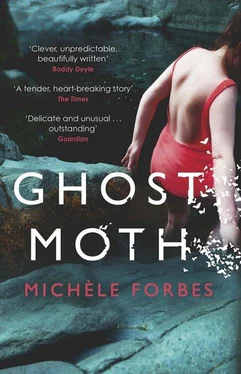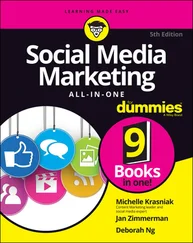He moved with ease. For him, just another walk home by the river.
They had set off from the corner of High Street, across the Albert Bridge, passing by the McConnell’s Weir, where a steel girder had broken away from one of the abutments and had lodged itself in the water. In the dark, she could hear the girder confusing the current. They continued along the Ormeau Embankment, where suddenly the light just seemed to fall away from them in pieces. Eventually, they found a sitting stone just a little downstream of the Ormeau Bridge, a flat hunk of rock where the narrow path broadened a little on the embankment. The river below them was the color of metal.
She felt as though the sharp night air was skinning and deseeding her senses. Why? She could not explain it to herself. Something to do with the murky blackness, perhaps. Something to do with Tom’s playful disregard for her: Taking her for a walk along the embankment with no moon to guide them. Something to do with what Ivy had said about him. It was all playing on her mind. She felt a shiver through her spine.
Then out of the dark he took a box of matches and his tailor’s notebook from his pocket. He opened the book and tore a page from its center. He twisted the paper and set it alight with a match. Their faces were illuminated for a few seconds in its glow. Then he gently threw the twist of paper into the river. He tore another page and set it alight and then another, and another. Tiny bombs of light fell into the black. Blossomed on the water like fire lilies. They held their light in the wet dark for a few moments and floated in a cluster with the current, then went out. She breathed the night air in. She watched the display. She listened to the sound of the water against the stones. She sighed. She began to feel warmer as they sat together. Her eyes adjusted to the dark. She looked out over the river. The reeds were brushed flat like long, wet hair against the bank from the last fall of heavy rain. She lifted her head. The night was beautiful. The sky so full of night clouds, it was as though it wasn’t there at all. Seen through his eyes, her city was transforming itself in front of her, and she realized that it wasn’t what surrounded her that was affecting her as much as his interpretation of it. Her city was rounding itself out of darkness and into light. Like a new world being bidden. She looked at him as he put a match to another twist of paper and a tiny arc of light streaked his face. He brings wonder out of the ordinary, she thought. That is his talent. His gift to me. There is no need for me to be unsure. He held the twist of paper up to her face. Show me, he said. She smiled at him. She knew what he wanted. She opened her handbag and took out her mirror and her lipstick and, as the paper burned close to her face, she eased orange-red across her lips. Then she took out her music sheet and, folding it in half, she pushed it against her mouth to take the excess. He watched her. I do this every time before I sing, she said to him. Every time it’s a signal that I will nurture my dreams until they come true. What dreams, Katherine? he asked. To sing, she said. To sing all over the world, to travel and see what the world has to offer. To go to America. She laughed. You don’t think it’s stupid or mad to think like that, to want to do that? No, he said, far from it. I’ll follow you, he said, and I’ll dress you in silks. I’ll make all your costumes big enough so that I can hide under your skirts. She laughed again. He took her music sheet in his hand. You know what the words mean? He asked her. No, she said, she didn’t, well not exactly. Not all of them. You should be ashamed of yourself, Carmen. Here, take this. He handed her another twist of paper. He ignited it. It burned in her hand. Then, he read aloud, “Si tu ne m’aimes pas, Si tu ne m’aimes pas, je t’aime; Mais si je t’aime, si je t’aime prends garde a toi!” So, this is what you are saying to José, he said. And then, he wrote out his translation for her at the bottom of her music sheet: “Love you not me, love you not me, then I love you; But if I love you, if I love you, beware of me!” How do you know these things? she asked him.
The paper light went out and the river lilies faded. He and she disappeared together into the black of the world. But when he kissed her, she was all the color of orange-red.
You don’t think I’m mad to have dreams like that, do you? she asked him.
No, he said, I don’t.
You don’t?
She alighted the number thirty-one trolley bus into town. The conductor pulled on the bell rope. As the trolley bus pulled away from the curb, she reached for the rounded grab handles on the ends of the seats and carefully made her way down to the front of the lower saloon. She tucked her pearl gray woolen coat under her and sat down on the princess blue leather seat. She sat, appalled at herself.
Her menstrual period had been only one week late, but this was so unusual for her, for her cycle had always been regular. So regular, in fact, that, month by month, she could predict when she would start almost to the very hour.
In her pocket she carried a set of her mother’s rosary beads. It wasn’t in her nature to pray, even though her mother had always insisted on the family saying the Rosary every evening for as long as she could remember, even though they never missed Mass on a Sunday, even though the nuns at school had driven Catholicism into her with a devout and steely determination. But she needed to turn to something. She needed providence, intervention; she needed her luck to change. She slipped her hand into her coat pocket to touch the rosary beads and whispered a prayer.
The conductor came to collect her fare, tapping impatiently on his ticket machine. She handed the conductor twopence for the short journey she was taking, only three stops from her flat on the Castlereagh Road to the corner of Templemore Avenue. She would walk the rest of the way from there. The conductor punched a hole in a mustard-colored ticket and handed it to her. She held the ticket in one hand and with the other she wiped the misted window beside her and looked out through the finger-width slices of clear glass as the streetlights moved past her in long, crystal streams.
Only one week late.
And for that week, she had never felt so much confusion. Her emotions had swung, like a pendulum, from one absolute to another. One moment, she would picture that everything was as it once had been. Tom had somehow suddenly melted away in her mind and she and George were a devoted couple again. The next moment, her heart would seize with panic at the very thought that she might never see Tom again. Over and over again she brushed against, then swept past the unthinkable: She was one week late.
She rubbed her finger anxiously where, for a brief time, she had worn her engagement ring. It would be weeks before she would be able to pay the remaining money due on the statuette and retrieve her ring. What had she been thinking? George had believed her when she had told him that she had thought it best to put the ring away safely until after Carmen had finished. She could not wear it as the character Carmen, she explained to him, and she could not possibly run the risk of taking the ring off in the rehearsal room or in the church hall — where they would perform the following week — as so many things went missing. And George had thought it prudent of her. He had not questioned her decision for a moment. She had taken advantage of his kindness, she knew. She had betrayed him. She was appalled at herself.
Over the past few weeks she had seen very little of George. He had been helping to organize a ceremony in honor of the members of the Fire Service who had helped in raising money for the rebuilding of the Ulster Hospital for Women & Children. George himself was to receive a commendation at the ceremony for his contribution as a retained fireman, and, sitting on the number thirty-one trolley bus, she was on her way to join him.
Читать дальше












